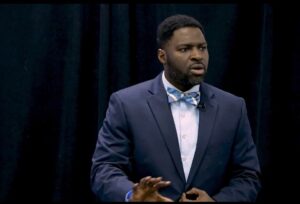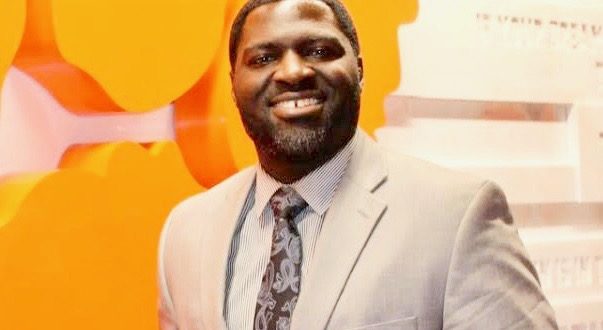Clemson University is developing a reputation for producing NFL first-round draft picks at the quarterback spot. After Deshaun Watson won a national title with the Tigers, the Houston Texans selected him with the 12th pick in 2017. Experts project current Clemson QB Trevor Lawrence, who captured a national title as a true freshman, to be the consensus No. 1 overall pick in the 2021 NFL Draft. However, long before Clemson produced these two amazing talents, Woodrow ‘Woody’ Dantzler was the top Tiger on campus. Dantzler was one the first signal-callers to thrive in the spread offense. In 2000, Dantzler set an ACC record for rushing yards by a quarterback with 220 against Virginia. The following year, he became the first QB in NCAA history to pass for 2,000 yards and rush for 1,000 in the same season. As a motivational speaker, he gears his speeches toward diverse skill building and critical thinking while trying to tackle communication issues among today’s youth. He also mentors current Clemson football players through the university’s Tiger P.A.W. Journey Program.
While discussing the cultural change that has led to the recent success of Clemson’s football program, Dantzler opens up about whom he idolized growing up and much more.
Percy Crawford interviewed Woody Dantzler for Zenger News.

Zenger: How is everything going, bro?
Woody Dantzler: Everything is going good.
Zenger: During your time at Clemson University, as a quarterback, you didn’t seem to mind running in between the tackles. To me you brought a certain level of toughness and physicality to the position. Did you develop that at Clemson?
Dantzler: You know what, that is the first time I have been slated as someone that was physical. I don’t know. It probably could have been my upbringing because I was an outside kid. I worked with my older cousins and playing around, so I was used to the physical stuff, martial arts being in my background and a few other things. But I was actually that guy that didn’t like contact. That’s why I was able to develop the knack for not getting hit. I say this, too. A lot of times it [the hits] looked worse than what they were because of my martial arts training; I had pretty good body control. So, I can go with the hit and go with that and move with that instead of really observing that hit like it may have looked.
Zenger: Absolutely. I guess your willingness to run in between the tackles … at the time you were doing it, it was not popular amongst some quarterbacks who were more protected back then.
Dantzler: Exactly!
Zenger: You left Clemson with more than 50 records. Does one stand out or mean more than the others?
Dantzler: To me, none really stands out. It’s just the totality of being able to play on that level, perform on that level. For me, it was more about not letting my teammates down. So, the preparation I put into each week, the film study, the working out, extending my conditioning level, all of that was because I know I had guys depending on me and I didn’t want to let them down. So, the way I prepared, that — coupled with the fact that my dad taught me — ‘if you’re going to do anything, do it to the best of your ability’. So, with those two things in mind, the records, the standards and all that different stuff just kind of came with the territory.
Zenger: It seems as if you lived off your father’s words a lot. Two things I researched he told you and you utilize are: when you were going to Clemson, he told you to be more than just a football player and also he said each generation sets up the next generation. Basically, each one, teach one, and I love both messages.
Dantzler: You just pointed out two really important ones. ‘Don’t go up there just to be a football player’ was just to get me to go up there and not put myself in a bubble. Experience what life had to offer. Learn different cultures, learn different people, learn different environments so you will know how to adapt and move and gain insight in whatever environment you’re in. That will help you succeed in any environment — the whole thing of setting up the next generation to be equally successful. If you move back into your … just consider the civil rights movement. A lot of those people, what they did in fighting for the rights of Black people and fighting for the people to have the rights to vote, a lot of them knew that they would never get those rights, but they knew the people coming behind them would. That’s why they fought; that’s why they worked and strategized and sacrificed. That’s what it’s about. My life is not about me. That’s one of the things my dad was teaching me. Your life is not about you. Your life is about the people to come. You want to leave this world better than what you found it. You want to set your kids up to go further than what you went. You can only take the torch but so far, but sooner or later you gotta pass it off. And you want to make sure when you pass it off, you want to give it to them in space where they can take it and go further.
Zenger: It takes a different type of person to fight for something that you won’t directly benefit from but someone else will.
Dantzler: Right! You’re absolutely right.

Zenger: You look at where Clemson is as a program and the success that it has had of late. Obviously, Coach Dabo Swinney changed the culture, but you were a part of that era where Clemson started to win eight or nine games a season. What do you think of these highly successful Clemson teams?
Dantzler: It is the culture shift. You get to the point where, Coach Swinney has said it himself, the guys go into the game and they expect to win. It’s not, “I hope we win,” it’s not, “I think we can win,” it’s an expectation. No matter how the game flows, no matter what happens, it’s an expectation to win. So now that I expect to win, I know there are certain things that I’m going to have to do to put myself in a position to win. So, that whole culture has shifted, the mindset of the players has shifted, the staff has all bought in. He talks about being all in. One thing that I like that they do, before each game … I’m not sure if they still do it; they probably still do. Right before they come out for pre-game, there is a token on their bench where their locker is. And as they are walking out of the locker room, the strength coach is standing there with a bucket, and I got this one chip, this is all I got, and they drop it into the bucket as they go out to the field. It’s that whole thing of, I’m going all out. I’m putting in everything I got. It shows you what that environment is like. And it’s not just the players, but it’s the coaching staff, it’s the support staff. You think about the video department, you think about the nutritional department and the strength department — all of these things that come together in working towards one common goal.
It’s just a different culture there now. Even preparing the guys with Tiger P.A.W. Journey. I talk about them all the time because most people see football. And they see the guys out there on the field, and you see them practicing and all these different things. But you don’t see what’s going on with them actually developing the individual. So, I’m teaching this because not everybody is going to go to the NFL. And then after that, there is life after football. So, these guys are getting internships during the summer. They are traveling overseas to do servant work. They are going through the interview process. They are bringing companies into Clemson to sit down and teach them how to prepare for an interview and how to prepare for corporate America. All these things that are building a total man are just wonderful. Again, it just speaks to the culture of Clemson now.
Zenger: I read an interesting article the other day and it basically asked the question, in today’s game, would Woody Dantzler be drafted into the NFL as a quarterback? Do you think the position has changed so much that you would not have been switched to running back?
Dantzler: Oh, most definitely! And I hear that a lot. It’s that whole thing that we discussed earlier. It just wasn’t my time. I played the role that I was supposed to play for this thing to be what it is. I’m not taking all of the credit because there were guys that came before me that were opening people’s eyes, too. I just took the torch from them and carried it as far as I could. Another good friend of mine, Antwaan Randle El, he switched over to receiver, but he was another one. Kordell Stewart. He was ‘Slash.’ If you go back to that, he was the guy that got into that because he was playing quarterback, receiver and whatever else position they wanted him to play in Pittsburgh. You got different guys that were able to do different things, and I am just happy to be a part of that conversation. It was coming because if you think about it, look at some of these guys on defense now. The way they move, how big they are, how fast they are, how athletic they are. Even though he’s been around for a while, the “Tom Bradys,” guys sitting in the pocket and pick you apart are kind of becoming extinct because these guys are so fast and smart on defense. You gotta have somebody that can move at some point. That 6-5, 6-6 [QB] standing in the pocket, throwing the ball down the field is not the thing right now.
Zenger: During your time, there were only a handful of black quarterbacks. Did you have one in particular whom you idolized?
Dantzler: It was Warren Moon, all day and all night. That’s why I wore the No. 1. That was actually one of the highlights of my life; I actually got to meet him a couple of years ago at an event in Atlanta. So, that was beautiful for me. I looked up to him because he was the one … even though he had to take that route and go to Canada, because back then there was the stigma that the quarterback was a cerebral position, and they didn’t believe the black athlete could handle that pressure, and have those leadership skills to do it. So, we can run, we can jump and do everything else, but the quarterback position is not where they wanted us at that time. It wasn’t overt, but it was covert. … a lot of people had that thought process in them and really didn’t know that they were influenced by some of the people they were taught by. It was a fight. So, to watch him come out of college and take the route of going to play in Canada, and then come back and be successful and make it into the Hall of Fame, it was proven that it can be done — a guy like Doug Williams being the first to win a Super Bowl.
Zenger: Does Woody Dantzler play college football during a COVID-19 pandemic?
Dantzler: I would have most likely decided to play. That’s just me again, the whole thing of not wanting to let my teammates down. Other factors may have come into it, but you know, it’s one of those things where, as an individual, yeah, you’re a part of a team but you gotta look at the factors, do the real research. That’s what I hope — these kids that are opting out are doing the research themselves, gathering an understanding, talking to different people to get the full scope of making an intelligent decision. Once they make the decision based off of information that they researched and understood and they feel like it’s the best decision for them, then I’m all for it. I just don’t want them to be making a decision based off of false information, bad information or someone with slanted motives trying to get them to do something that they don’t need to do. If they have done the research and they are making the best decision for them, I’m all for it. Nothing against that, but if it’s done to where they don’t have all the information and they could’ve made a different decision had they had all the info and done the research themselves.
Zenger: Were you able to be hands-on with Deshaun Watson when he was at Clemson or able to mentor him in some manner?
Dantzler: Yeah! I mentioned Tiger P.A.W. Journey. That’s the name of the program run by Jeff Davis and headed up by Rashard Hall. I participated in what they call ‘Tiger Hood.’ It’s where former players mentor current players. I’m in sales; my territory allows me to work the upstate. So, I’m in Clemson a good li’l bit. I pass through. Yes, I’ve had conversations with different guys. I mentor guys on the team currently. I have been doing that the past few years. DeShaun was that special individual. You just knew something was different about him. He doesn’t remember our first meeting because I actually remember him when he came to camp as a sophomore. I hope I don’t get in trouble (laughing), but I remember telling him, “Man, you’re a sophomore. You’re in the 10th grade. You have two more years. Enjoy high school.” They wanted me to go over there and convince him why to come to Clemson and this and that, but I went over there and I sat down and I was like, “Look, you got two more years of high school. Enjoy it! When you get into your senior year, then you can start thinking about which college you want to go to. If you come to a decision before then, then great. If not, don’t feel pressure to make a decision as a sophomore to go anywhere.” So, that was just the type of things we just talked about. We talked about real life.
Zenger: What are your thoughts on Trevor Lawrence, who by most accounts will be the first pick in next year’s draft?
Dantzler: With Trevor, as they say, he’s just one of those guys. He has that factor. DeShaun had that factor, and Trevor has that same “it” factor. He walks into a room and he just changes the environment with his presence alone. And not to mention he has the work ethic, he has the humility, he has all of the intangibles to be great. So, I’m not surprised at all that most likely he is going to be the #1 pick in the draft. He’s just that guy.
Zenger: You mentor Clemson players and you also do some motivational speaking all over the country. How important is that for you to give back and integrate that ‘each one, teach one,” mentality?
Dantzler: That’s the thing. One thing I noticed is the generation gap has gotten so big to where there’s no passing down of information. There’s no conversations. With the explosion of single parenthood, these kids having babies when they’re young. Grandma, too, grandmas now are 45 years old. Those conversations and that knowledge is not being passed down like it used to be. My role … all I want to do is do what my dad did for me. We would talk, and I would ask him a question about something, and he would answer my question with a question. But what he was doing was making me think through the process, think through the situation myself to come up with an answer. Now, if I struggled a little bit, he would give me a little nudge, but for the most part he was teaching me how to think.
And right now, a lot of our young people don’t have those critical thinking skills. They don’t know how to look beyond the surface. They don’t know how to come outside of their own bubble to truly understand what’s going on. They get information and then they just go with the information. That whole thing of trust but verify — we don’t do the verifying part because it takes effort on our part. And that’s what I want to instill in these kids. Just the art of conversation. We don’t talk no more. People don’t talk no more, and it’s even more evident to the fact of, if I disagree with you, then you hate me. That’s what it really boils down to. We can have a disagreement about an issue and not hate one another. Just pushing kids to go beyond the surface to develop themselves to reach their full potential is what I want. And you can’t reach your full potential when you’re only looking at half the information or only taking in half the information. My goal is to get people to get back to thinking and thinking things through. We need to get back to critical thinking — having those conversations and being able to build — because we need one another.
Zenger: It’s an honor speaking with you, brother. Thank you and continue to be a voice to educate.
Dantzler: Thank you. I appreciate you thinking about me. I appreciate the conversation.
(Edited by Stan Chrapowicki and Allison Elyse Gualtieri)
The post Before Deshaun Watson and Trevor Lawrence, There Was Woodrow ‘Woody’ Dantzler appeared first on Zenger News.
 Westside Story Newspaper – Online The News of The Empire – Sharing the Quest for Excellence
Westside Story Newspaper – Online The News of The Empire – Sharing the Quest for Excellence




